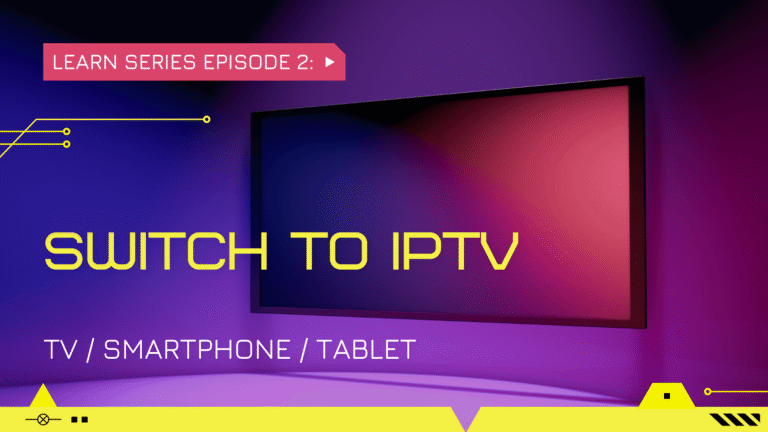In today’s digital world, the way we consume television and entertainment has evolved drastically. Gone are the days when cable and satellite TV were our only options. Enter IPTV, or Internet Protocol Television — a modern solution for streaming live TV, video-on-demand, and more, all through the internet. But what exactly is IPTV, how does it work, and why are so many people switching to it? In this guide, we’ll break down everything you need to know about IPTV in simple, easy-to-understand terms.

What Is IPTV?
IPTV (Internet Protocol Television) is a system where television services are delivered using the Internet Protocol (IP) instead of traditional methods like satellite or cable. In short, instead of receiving TV content through satellite signals or fiber-optic cables, you stream it over your internet connection — just like you would watch videos on YouTube or Netflix.
IPTV gives you more flexibility and control over what you watch and when you watch it. You can stream live TV, access video on demand (VOD), and even time-shifted programming (catch-up TV) using various IPTV services.
How Does IPTV Work?
To understand IPTV, it helps to compare it to traditional TV services.
Traditional TV:
- Uses satellite or cable for signal delivery
- Channels are broadcast to everyone at the same time.
- Limited interactivity — you watch what’s being shown live.
IPTV:
- Content is streamed via the internet.
- You request what you want to watch — when you want.
- Offers both live TV and on-demand content.
- Requires a device with internet access (smart TV, smartphone, tablet, computer, or set-top box).
IPTV works through a client-server model. The IPTV provider stores content on servers, and when you choose a channel or show, the content is streamed directly to your device in real time.
Types of IPTV Services
There are generally three main types of IPTV services:
1. Live IPTV
Live IPTV streams real-time television programs as they are being broadcast. This is similar to traditional TV but delivered over the internet.
Examples: Sports events, live news broadcasts, or live TV channels.
2. Video on Demand (VOD)
VOD allows you to choose and watch videos whenever you want, rather than at a scheduled broadcast time.
Examples: Watching movies, TV shows, or documentaries on demand — similar to Netflix.
3. Time-Shifted IPTV (Catch-Up TV)
Time-shifted IPTV lets you watch previously aired content at your convenience. This is useful if you miss a live show and want to catch up later.
Examples: Replaying a show that aired yesterday on a specific channel.
What Do You Need to Use IPTV?
To start using IPTV, you’ll need a few basic things:
1. A Reliable Internet Connection
A stable, high-speed connection (at least 10 Mbps) is essential for smooth streaming without buffering.
2. A Device to Stream Content
You can watch IPTV on:
- Smart TVs
- Smartphones & tablets
- Computers (laptops/desktops)
- IPTV Set-top boxes (like MAG, Firestick, Android TV box)
3. An IPTV Subscription or Service
Choose a trustworthy IPTV provider that offers the channels and features you’re interested in. Many services, like Pillow IPTV, offer free trials so you can test the service before committing.
4. An IPTV App or Media Player
Apps like IPTV Smarters, TiviMate, GSE Smart IPTV, or VLC Media Player are commonly used to load IPTV playlists and stream content.
Advantages of IPTV
IPTV offers several benefits that make it appealing to a wide range of viewers:
1. More Choice and Flexibility
You’re no longer restricted to the channel packages offered by cable companies. You can choose the content you actually want to watch.
2. On-Demand Access
Watch content on your schedule, not the broadcaster’s.
3. Global Content
Access channels and programs from all over the world, not just your local region.
4. Affordable Pricing
IPTV subscriptions are usually much cheaper than traditional cable or satellite packages, especially when bundled with VOD and international channels.
5. Multi-Device Support
Stream your content across various devices at home or on the go.
Are IPTV Services Legal?
The legality of IPTV depends on the provider. There are both legal and illegal IPTV services:
- Legal IPTV services are licensed to distribute the content they offer. Examples include Hulu, Netflix, and Sling TV.
- Unlicensed IPTV services offer paid access to copyrighted content without permission. While many of these services are widely used, they operate in a legal gray area and may be shut down at any time.
Tip: Always do your research and choose a legitimate IPTV provider to avoid legal trouble and ensure reliable service.
Common IPTV Features
A good IPTV provider often includes the following features:
- Electronic Program Guide (EPG): Like a digital TV guide for channels.
- Catch-Up TV: Watch shows that aired in the past few days.
- VOD Library: Access to thousands of movies and series.
- Multi-Screen Support: Watch different content on multiple devices at once.
- Anti-Freeze Technology: Smooth streaming with minimal buffering.
Why Is IPTV Growing in Popularity?
The popularity of IPTV is growing for a few key reasons:
- Cord-cutting trend: Many users are leaving expensive cable contracts behind.
- On-demand culture: Viewers want flexibility and control.
- Access to global content: People enjoy streaming international channels and shows.
- Better technology: Faster internet speeds and better apps make IPTV more accessible.
Final Thoughts
IPTV is changing the way we watch television by offering more control, flexibility, and choice — all while cutting down on costs. Whether you want to enjoy live sports, binge-watch your favorite shows, or explore international content, IPTV has something for everyone.
As with any service, it’s important to choose a reputable provider, test the service with a free trial, and make sure it meets your needs. Services like Pillow IPTV offer a 24-hour free trial so you can experience everything before making a decision.
Ready to make the switch? Try an IPTV service today and discover a smarter way to watch TV.



![Read more about the article 5 Adult IPTV Service Providers of 2026 [18+]](https://pillowiptv.com/wp-content/uploads/2026/01/adult-iptv-providers-768x432.jpg)